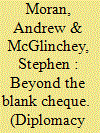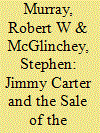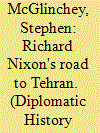| Srl | Item |
| 1 |
ID:
147590


|
|
|
|
|
| Summary/Abstract |
When President Gerald Ford decided to maintain and deepen arms relations with Iran, he cemented a momentum that became near impossible for a successor to break by continuing the policy of his predecessor Richard Nixon. Nixon had given the Shah of Iran a “blank cheque” to purchase whatever American arms he desired—short of nuclear weapons. Although Ford’s authority would be challenged by members of his own Administration and a Congress seeking to claw back some of its authority, the need to support allies in the Middle East against the threat of the Soviet Union, even during a time of détente, remained paramount.
|
|
|
|
|
|
|
|
|
|
|
|
|
|
|
|
| 2 |
ID:
154113


|
|
|
|
|
| Summary/Abstract |
It appeared that as 1977 dawned, the political climate in the United States might render multi-billion dollar arms sales into unstable regions a thing of the past. Jimmy Carter triumphed in the presidential election of November 1976 on a popular platform of arms control and the introduction of human rights considerations into American foreign policy. His transition from that idealistic candidate to the president who agreed to sell Iran a fleet of highly advanced AWACS aircraft, as part of a record breaking $5.7 billion arms package, is therefore outwardly confusing. Yet, when examining the entrenched policy path that Carter inherited regarding arming Iran, and the larger needs of Cold War containment, the logic of Carter’s decisions essentially to betray his own policies in this case becomes clear.
|
|
|
|
|
|
|
|
|
|
|
|
|
|
|
|
| 3 |
ID:
121477


|
|
|
|
|
| Publication |
2013.
|
| Summary/Abstract |
During the 1960s, Iran transitioned from a client state into an emerging partner of America. Crucial to the analysis of this transformation is understanding how Iran progressed from a low-priority military aid recipient in the 1950s to a military credit purchase partner in 1964. The transformation was characterized by frequent difficulties and disagreements as the Shah's demands and Washington's ability and/or desire to fulfill those demands rarely coalesced until the twilight of the Johnson Administration.
|
|
|
|
|
|
|
|
|
|
|
|
|
|
|
|
| 4 |
ID:
131453


|
|
|
|
|
| Publication |
2013.
|
| Summary/Abstract |
By the time of Richard Nixon's arrival in office Iran had already become America's single largest arms purchaser. This was the result of an evolutionary process that had been underway for two decades. Nixon did not just change that evolutionary pattern of arms sales with Iran, he completely revised U.S. thinking on Iran's regional role. By the end of his first term in office, Nixon had leveraged U.S. Middle Eastern regional policy primarily around the focal point of a militarily strong, pro-U.S. Iran. In concert, the shah was encouraged to begin an unprecedented military spending spree. Consequently, in mid-1972 following a meeting of the two leaders in Tehran, Iranian annual purchases went, virtually overnight, from being measured in the tens of millions to being measured in the multi-billions. Tracing the complex evolution toward that meeting, and the accompanying policy shifts, form an underappreciated part of Cold War history.
|
|
|
|
|
|
|
|
|
|
|
|
|
|
|
|